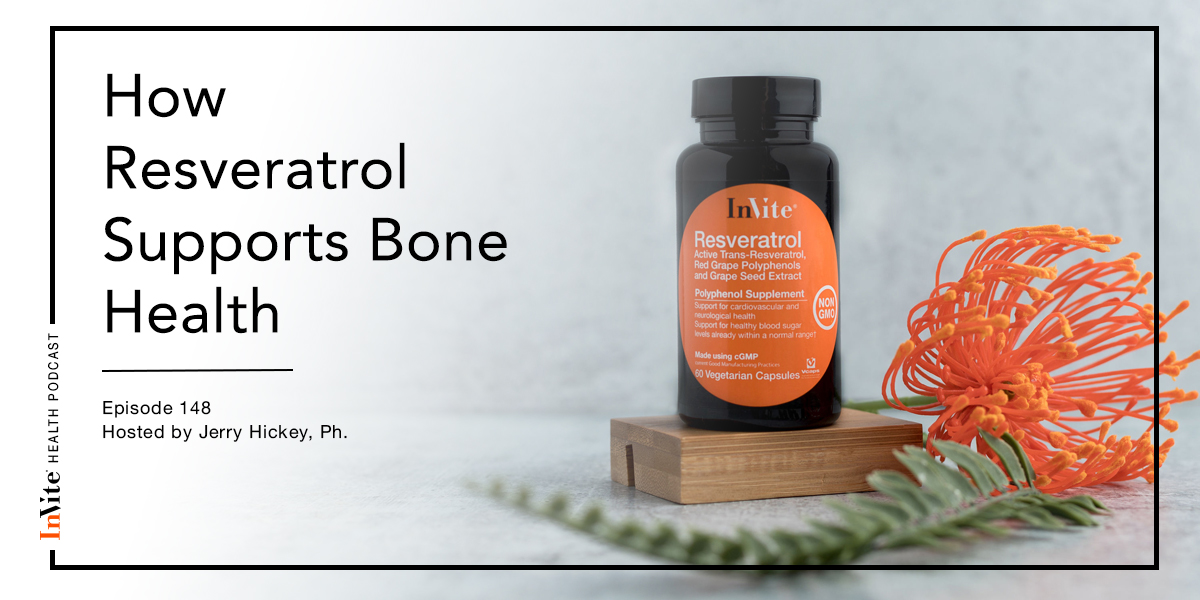How Resveratrol Supports Bone Health – Invite Health Podcast, Episode 148

Invite Health Podcast, Episode hosted by Jerry Hickey. Ph
Subscribe Today!
Let’s discuss how Resveratrol, a well known nutritional supplement, benefits bone health. Resveratrol has many human clinical trials behind it. Most of them have to do with its vaso-active activities. This means that it supports good circulation to the legs, muscles, heart, brain, organs and tissues. Resveratrol has also been studied for its positive effects on brain health and memory. But today we are going to discuss its benefit on bone health.
The Impact of Your Weight on Bones
Decades ago, researchers and scientists started to recommend weight baring exercises to protect and rebuild bone. Weight baring exercises work against gravity and includes walking, running and dancing. When you do these kind of exercises, you are releasing hormones that build bone. These hormones are not site-specific; they go around your circulatory system and effect your entire skeletal structure.
When you are obese, the fat cells on your belly and all over your body, release chemicals that are metabolically active. These chemicals tend to cause inflammation and are called cytokines, or chemical messengers that excite and misdirect the immune system. Part of the damage caused by this inflammation, is damage to bone. So, overweight or obese people break down bone and lose more bone than a typical person.
Bone Health Benefits of Resveratrol
The first study I saw that provided evidence that Resveratrol helped build bone was from the Journal of Endocrinology and Metabolism from researchers from Our House University Hospital. The study was on 74 middle aged men that were obese and had a BMI over 33. The participants were given Resveratrol or placebo every day for 16 weeks and the impact on bone was evident. The bone density of the lumbar spine increased, along with the bone alkaline phosphatase (a marker for building bone). The more Resveratrol they had, the more this increased.
A study in the journal Biomolecules gives us big reasons about why Resveratrol would be good for bone. Researchers in dentistry over at the University of Palerno and other research institutions in Italy were studying Resveratrol in regards to surgical procedures in the jaw and in the gums of the mouth because it helps assist the rebuilding of bone, which is important for different kinds of surgeries of the jaw. The researchers highlighted the Resveratrol promotes osteoblasts and inhibits osteoclasts. Resveratrol stimulates the production of osteoblast cells that help to build bone. Meanwhile, they are restricting the activity of osteoclasts, or cells that breakdown bone. When you are young, there is a balance between these bone building and bone removal cells. This is because the bone ages, so your body must remove it in order to replace it with new, healthy bone. But we lose this balance with age. The bone-building osteoblasts decline in number, but the osteoclasts are still very active. Resveratrol, according to this study and many others, helps restore balance between them.
Learn How to Build Bone Even When Your Are Sleeping. Click Here! >>
A study from the journal Nutrition and Diabetes studied the effects of Resveratrol on bone health in 200 patients with type 2 diabetes. This is a double-blind, placeobo-controlled randomized clinical trial over a six month time period with different strengths of Resveratrol. People with type 2 diabetes are at an increased risk of fracture. Scientists have found that the sugar in the blood is toxic to the bone, as it inflames it. Diabetics lose bone at a faster rate than the general population. The results showed that different amounts of Resveratrol improved bone alkaline phosphatase. They found that diabetics on placebo, within even just six months, lost a lot of bone. But the diabetics on Resveratrol were not losing bone, but actually it was protecting their bone mineral density (how thick their bone was) and their bone mineral content (they were not losing calcium from their bone). This is a pretty significant finding.
Thank you for tuning in to the Invite Health Podcast. You can find all of our episodes for free wherever you listen to podcasts or by visiting www.invitehealth.com/podcast. Make sure you subscribe and leave us a review! Follow us on Facebook, Twitter and Instagram at Invite Health today. We’ll see you next time on another episode of the Invite Health Podcast.


